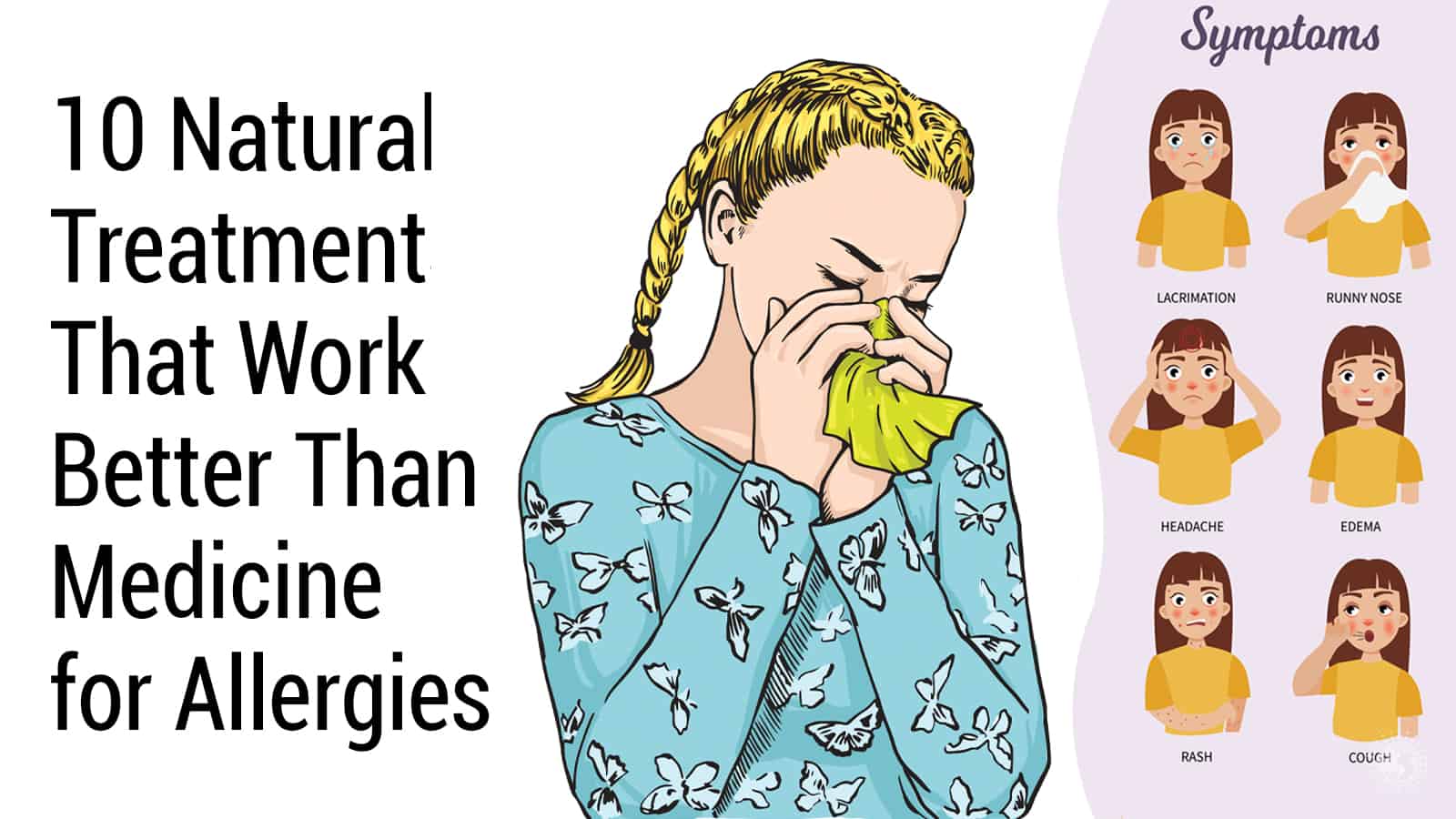People who experience the unpleasant and sometimes debilitating health impacts of allergies might benefit from experimenting with proven natural remedies. These natural treatments, which have clinical backing for their effectiveness, may represent viable alternatives to conventional medicine for allergies.
Many allergy sufferers can attest to the uncomfortable side effects of many types of medicine for allergies. In some cases, the side effects of patients’ medicine for allergies are worse than the allergies themselves!
Although pollen allergies are the most common, allergies come in many forms, with various causes for each.
In this science-backed article, we’ll focus on the ten best natural treatments for allergies. You can try these out at home and see for yourself. These natural substances positively influence the immune and neuroendocrine systems. In turn, they produce tangible benefits in terms of relief from allergies.
Once you discover the right combination that works for you, then it may be possible to wean yourself off of your medicine for allergies. As always, seek consultation from a medical professional before making changes to your allergy-fighting regimen.
10 Natural Treatments That Work Better Than Medicine for Allergies
Contents
1. Acupuncture
For many people who battle allergies, acupuncture is an essential tool to fight their symptoms.
Acupuncture was once relegated to the sidelines as quackery and “pseudoscience.” Now, many widely in the West accept this method as a proven treatment strategy for many conditions–including allergies.
Among people who deal with seasonal pollen allergies, acupuncture is particularly popular. In one study of seasonal allergy sufferers given acupuncture, the subjects showed significant improvements in symptoms.
Best of all, acupuncture clinics have popped up everywhere in recent years. If you live in a large or even mid-sized city, you likely have access to affordable acupuncture therapy.
2. Apple Cider Vinegar
Anecdotal accounts of allergy sufferers finding healing in the form of apple cider vinegar are ubiquitous on the web. Of course, countless people who benefit from ACV for their allergies swear by this natural remedy
The scientific evidence backing up its effectiveness, though, has not caught up with ACV’s popularity. Preliminary research is promising, but more clinical studies are needed to confirm ACV’s allergy-busting abilities.
What we do know, however, is that ACV positively modulates the immune system. This discovery offers a theoretical explanation of how ACV can suppress the effects of allergens.
3. Chiropractic Care
Chiropractors’ work is often the subject of intense scrutiny. The jury is still out on the extent to which chiropractic care deserves a place at the medical table.
Nonetheless, the results show that chiropractors can provide either real or perceived benefits to allergy sufferers.
Consider giving chiropractic care a shot if you’re looking to ditch your medicine for allergies. Chiropractic is safe and affordable, so even if it doesn’t work for you, you won’t have lost anything significant.
4. Probiotics
For several reasons, in addition to its role as an alternative to medicine for allergies, probiotics are important. Consider adding easily-sourced probiotics to your everyday routine to see results.
Probiotics work by rebalancing the ratio of good bacteria in the gut to bad bacteria. We now know that a huge portion of the human immune system is concentrated in the gut. Allergies are an immune response. This means that promoting optimal gut health will assuredly have a beneficial impact on allergies through its immune system mediation.
Beneficial probiotics are found in yogurt, kefir, kombucha, kimchi, and sauerkraut.
5. Elimination Diets for Food Allergies
Doctors consider elimination diets the “gold standard” for eliminating common food allergies
The essential idea behind an elimination diet is to cut out the vast majority of everyday foods that you eat. You want to whittle your culinary choices down to a few staple foods. The foods you consume during this period should be least likely to provoke an allergic response.
After two-three weeks of strict adherence, you can begin to add new foods one by one. With each new food added to your diet, you must wait three days to check for any adverse reactions.
Once you know through observation that a food item is not contributing to your allergies, give it a go green check. You can check it off the list and move onto the next one. Repeat the 3-day observation process with each food.
In the end, you will have a much clearer understanding of which foods in your diet function as allergens. Eliminate them from your diet.
After you’ve taken out the offenders, you can move on to include allergy-fighting compounds like quercetin in your diet.
6. Quercetin
Quercetin is arguably the top all-natural medicine for allergies that we can source through our diets. It is a plant compound belonging to a category called “flavanols.” You may have heard of flavanols in popular media due to their numerous health benefits.
The available evidence shows that quercetin acts as both an anti-allergen as well as an antihistamine.
“Antihistamine” is a term used to refer to medicine for allergies, natural or synthetic.
Quercetin is sourced from onions, garlic, apples, berries, various teas, and red wine. It is one of the antioxidant compounds exulted in red wine.
Studies on mice have shed light on the elixir properties of quercetin. In one such study, the compound was shown to reduce airway inflammation, making it a great remedy for respiratory allergies.
7. Bromelain
Originally sourced from the juices of pineapples, bromelain is now also produced as a stand-alone supplement. This enzyme is increasingly popular for natural treating many conditions, including allergens.
You can work more bromelain into your daily diet by adding regular consumption of pineapples. Again, bromelain is also a prominent ingredient in many supplements.
Some people who use bromelain to treat their allergies experience stomach upset and elevated heart rate. Some women report changes to their menstrual cycles. Exercise caution when adding bromelain to your allergy-fighting arsenal.
8. Essential Oils
In addition to smelling great, essential oils also afford impressive allergy-suppressing benefits. Medical practitioners around the world have enlisted the aid of essential oils for thousands of years. Of course, their applications range widely.
The most effective essential oils for treating allergies include peppermint, eucalyptus, frankincense, lemon, lavender, and tea tree oil.
Many people utilize essential oils in baths by mixing the distilled plant oils in with their bathwater.
9. CBD
Cannabidiol, or CBD, is one of the dozens of health-promoting compounds found in the cannabis plant.
CBD offers an array of benefits, including its role in mitigating the symptoms of common allergies. CBD oil generally contains negligible amounts of THC, the compound responsible for the “high” of marijuana. It is, therefore, safe for children and others who hope to avoid cannabis’ psychoactive effects.
CBD is legal in all fifty states. You can order high-quality CBD supplements verified by third-party lab tests online.
A good starting dosage for most people is around 40 mg. Most people tolerate CBD well, even in high dosages. You will find minimal risks of side effects from CBD supplementation.
10. Vitamin D
Many call vitamin D the “sunshine vitamin” because it primarily absorbs via sun exposure. It is closely involved in several crucial processes.
The beauty of Vitamin D is that it is free when you soak it in from the sun. The scientific consensus is that 70% or more of the American population is deficient in this crucial vitamin.
More and more research accumulates daily linking Vitamin D to good immune system function. This is critical for allergy sufferers because their issues are essentially due to immune system dysfunction.
What puts you at risk for Vitamin D deficiency? Living in a colder climate with limited sun exposure and shorter days in the winter. Also, people with darker skin pigments such as African descendants, Native Americans, and South Asians are also at higher risk. Finally, vegetarians, and vegans, have higher rates of Vitamin D deficiencies.
For people with diagnosed deficiencies and those in at-risk groups, Vitamin D supplementation is an option. Most pharmacies and natural health stores sell potent Vitamin D supplements at affordable prices.
You can also boost your levels by adding Vitamin D-rich foods to your diet. Examples of rich dietary sources of Vitamin D include fish, dairy, and eggs.
However, getting outside as often as possible is the most effective way to maximize your Vitamin D intake.
Final Thoughts on Trying These Natural Remedies for Allergies
If you’ve been thinking about ditching your side effect-ridden medicine for allergies, you’re not alone.
Millions of allergy sufferers find relief each year in the form of the natural treatments described in this article. Additionally, science continually teaches us more about what triggers allergies and how to reverse them naturally.
Always consult with a medical professional before beginning drastic changes to your allergy protocols. Of course, you might need to experiment with several different combinations of natural treatments to find which one works best for you.
There isn’t a “one-size-fits-all” approach to natural allergy treatment. But with the rich approach and patience, finding relief naturally is possible.
Source: 10 Natural Treatments That Work Better Than Medicine for Allergies- powerofpositivity.com

